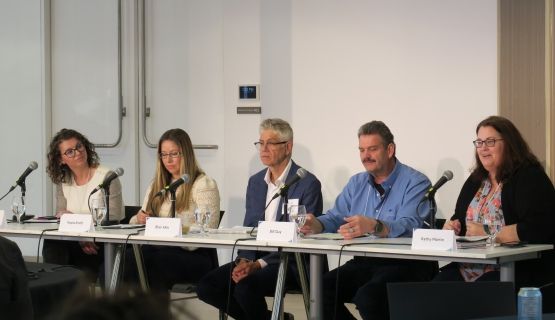Trusted research, with reach and impact
The Institute for Work & Health (IWH) is an independent, multidisciplinary, not-for-profit research organization located in Ontario, Canada. IWH conducts and mobilizes research that supports policy-makers, employers and workers in creating healthy, safe and inclusive work environments.
Latest news & findings

IWH’s Mustard Postdoctoral Award recipient announced
IWH is pleased to announce Dr. Cherise Regier as the new recipient of the Mustard Postdoctoral Award. This award aims to support the development of outstanding new and interdisciplinary researchers in the field of work and health. Throughout this two-year award, Regier hopes to continue her research on the intersections between job quality, mental health and labour market transformation.

New report shares insights on addressing opioid-related harms among workers
Last spring, IWH co-hosted a workshop with the Occupational Cancer Research Centre on opioid harms among workers. The event aimed to share evidence and diverse perspectives on opioid-related harms among workers, discussing contributors to these harms and identifying actions to address them in the workplace. A report is now available that summarizes the workshop and the insights shared by panelists and attendees.

IWH Speaker Series: Preventing PTSI work disability at first response organizations
Due to the nature of their work, first responders (paramedics, police and firefighters) are routinely exposed to traumatizing experiences. How are first response organizations helping to prevent post-traumatic stress injuries (PTSI) among their workers? On May 27, Dr. Emile Tompa shares findings from a study that set out to learn about organizational-level programs, services and practices to address PTSI for first responders.

IWH network event gathers safety leaders to share ideas, resources
This spring, attendees of IWH's second annual IWH Connects meeting had a chance to exchange ideas about research and resources for organizations in three key areas: building employer confidence in disability, equity, inclusion and accessibility practices; promoting health and safety in linguistically diverse workplaces; and addressing the psychosocial work environment.
IWH Speaker Series
Learn directly from IWH researchers themselves about their latest findings in health, safety and disability prevention. The IWH Speaker Series is a livestream webinar series that features new study findings from the Institute for Work & Health. The webinars are usually held once a month, on a Tuesday at 11:00 a.m. EST. Recordings are also available to watch on demand.
Explore the site
Tools and guides
Integrate evidence-based policies and practices into your occupational health and safety, return-to-work and rehabilitation programs. IWH has created a number of tools and guides based on our research findings that can help improve program outcomes.
Impact case studies
Find out how IWH research is making a difference. Read our impact case studies, in which policy-makers, workplaces and other stakeholders in health, safety and disability prevention tell how IWH research helped improve their policies, programs and practices.
Research summaries
Whether it’s a policy briefing, a systematic review summary or the highlights of a specific research project, we’ve compiled a number of plain-language summaries to help you understand the research we’re doing, what we have found, and how we found it.